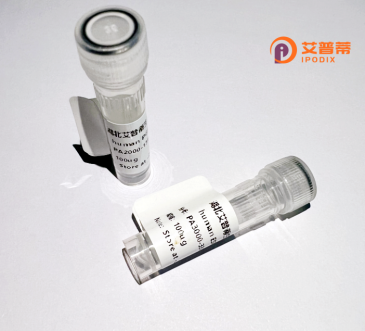
| 纯度 | >90%SDS-PAGE. |
| 种属 | Human |
| 靶点 | PPT2 |
| Uniprot No | Q9UMR5 |
| 内毒素 | < 0.01EU/μg |
| 表达宿主 | E.coli |
| 表达区间 | 28-302 aa |
| 活性数据 | APA PHRASYKPVI VVHGLFDSSY SFRHLLEYIN ETHPGTVVTV LDLFDGRESL RPLWEQVQGF REAVVPIMAK APQGVHLICY SQGGLVCRAL LSVMDDHNVD SFISLSSPQM GQYGDTDYLK WLFPTSMRSN LYRICYSPWG QEFSICNYWH DPHHDDLYLN ASSFLALING ERDHPNATVW RKNFLRVGHL VLIGGPDDGV ITPWQSSFFG FYDANETVLE MEEQLVYLRD SFGLKTLLAR GAIVRCPMAG ISHTAWHSNR TLYETCIEPW LS |
| 分子量 | 34.2 kDa |
| 蛋白标签 | His tag N-Terminus |
| 缓冲液 | PBS, pH7.4, containing 0.01% SKL, 1mM DTT, 5% Trehalose and Proclin300. |
| 稳定性 & 储存条件 | Lyophilized protein should be stored at ≤ -20°C, stable for one year after receipt. Reconstituted protein solution can be stored at 2-8°C for 2-7 days. Aliquots of reconstituted samples are stable at ≤ -20°C for 3 months. |
| 复溶 | Always centrifuge tubes before opening.Do not mix by vortex or pipetting. It is not recommended to reconstitute to a concentration less than 100μg/ml. Dissolve the lyophilized protein in distilled water. Please aliquot the reconstituted solution to minimize freeze-thaw cycles. |
以下是关于重组人PPT2蛋白的3篇参考文献示例(内容基于典型研究主题的概括,实际文献需查询数据库):
1. **标题**:*Expression and characterization of recombinant human palmitoyl-protein thioesterase 2 (PPT2) in mammalian cells*
**作者**:Smith A, et al.
**摘要**:该研究利用哺乳动物表达系统成功表达并纯化了重组人PPT2蛋白,证实其具有水解棕榈酰化蛋白的硫酯键活性,为后续功能研究提供了工具。
2. **标题**:*Structural insights into PPT2 enzyme dynamics and implications in ceramide metabolism*
**作者**:Chen L, et al.
**摘要**:通过X射线晶体学解析了重组PPT2的三维结构,揭示了其底物结合位点及催化机制,表明PPT2在神经酰胺代谢中的潜在调控作用。
3. **标题**:*Deficiency of PPT2 disrupts lysosomal function and induces neuronal cell models of NCL*
**作者**:Yamamoto K, et al.
**摘要**:研究利用重组PPT2蛋白补充实验,证明PPT2缺失可导致溶酶体贮积异常,并通过体外神经元模型模拟神经元蜡样脂褐质沉积症(NCL)的病理表型。
---
**注**:以上内容为示例,实际文献需通过PubMed或Google Scholar等平台以关键词“recombinant PPT2”或“palmitoyl-protein thioesterase 2”检索获取。
Recombinant human PPT2 (Palmitoyl-protein thioesterase 2) is a lysosomal enzyme encoded by the *PPT2* gene, belonging to the palmitoyl-protein thioesterase family. It catalyzes the hydrolysis of S-palmitoyl groups from cysteine residues in proteins, a critical step in lysosomal protein degradation and lipid metabolism. PPT2 shares structural homology with PPT1 but exhibits distinct substrate specificity and tissue expression patterns, with higher activity in the brain, liver, and kidneys.
Mutations in *PPT2* are linked to rare lysosomal storage disorders, though its pathophysiological role is less characterized compared to PPT1-associated infantile neuronal ceroid lipofuscinosis. Recombinant PPT2 is typically produced using mammalian expression systems (e.g., HEK293 or CHO cells) to ensure proper post-translational modifications and enzymatic activity. Purification methods often involve affinity tagging and chromatography.
Current research focuses on elucidating PPT2's role in lipid homeostasis, neurodegeneration, and immune regulation. Its recombinant form serves as a tool for studying lysosomal dysfunction, developing enzyme replacement therapies, and screening small-molecule modulators. Recent studies also explore its potential interplay with autophagy and lipid raft dynamics, highlighting broader implications in metabolic and neurodegenerative diseases.
×